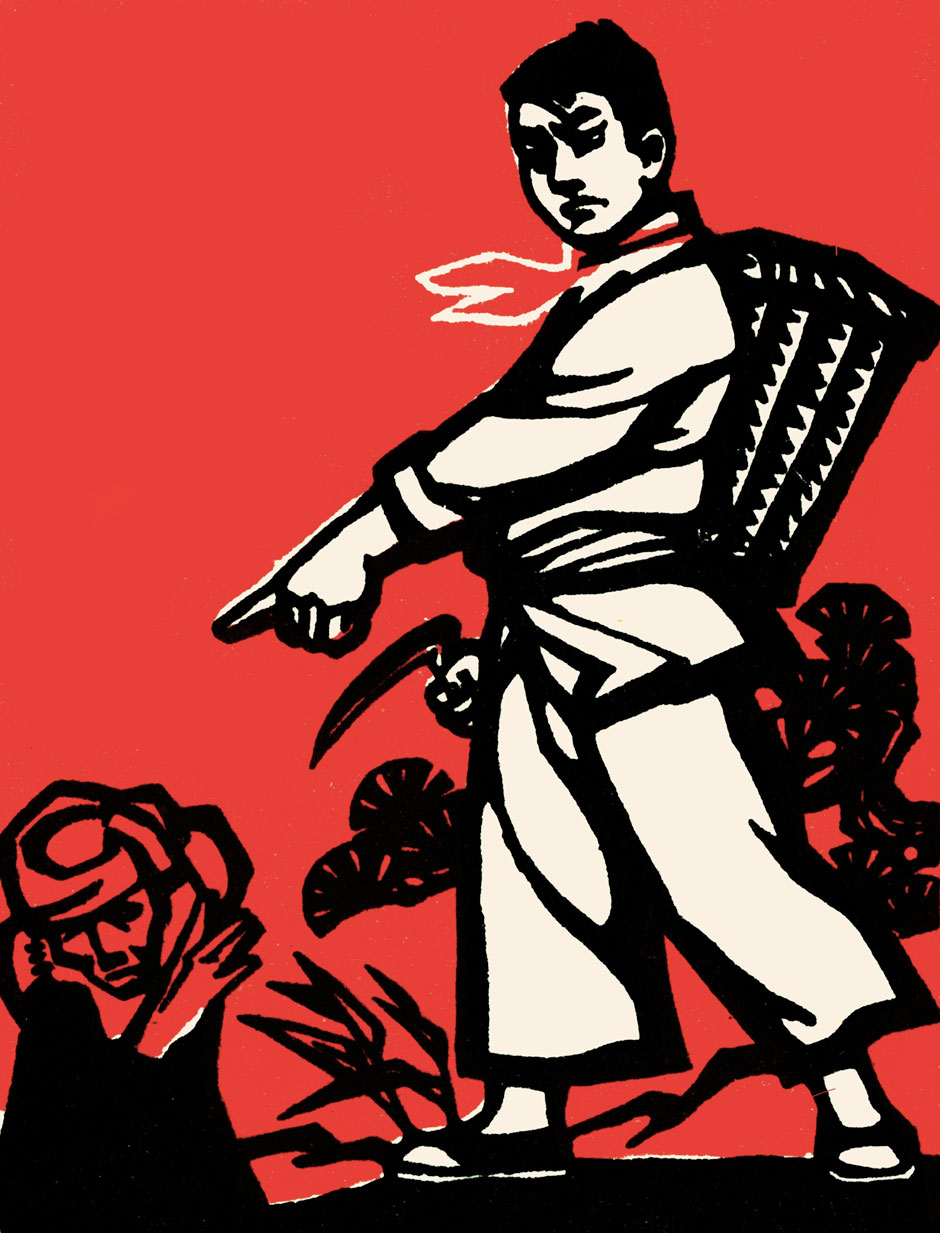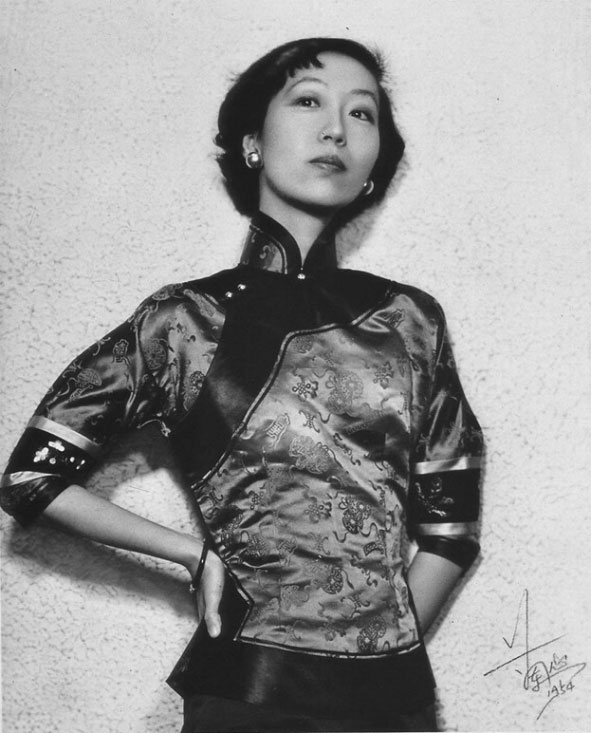It can be embarrassing for a China scholar like me to read Eileen Chang’s pellucid prose, written more than sixty years ago, on the early years of the People’s Republic of China. How many cudgels to the head did I need before arriving at comparable clarity? My disillusioning first trip to China in 1973? My reading of the devastating journalism of Liu Binyan in 1980? Observation of bald lies in action at the Tiananmen massacre in 1989 and in the imprisonment of a Nobel Peace laureate in more recent times? Did I need all of this to catch up to where Chang was in 1954 in her understanding of how things worked in Communist China, beneath the blankets of jargon? In graduate school I did not take Chang’s Naked Earth (published in Chinese in 1954 and translated by Chang into English in 1956) and its sister novel, The Rice-Sprout Song (also published in 1954 and translated by Chang into English in 1955), very seriously. People said the works had an anti-Communist bias. How silly.
In Naked Earth, Chang shows how the linguistic grid of a Communist land-reform campaign descends on a village like a giant cookie cutter. There are Poor Farmers, Middling Farmers, Landlords, Bad Elements, and more. When actual life doesn’t fit the prescriptions, so much the worse for actual life. Make it fit. A “cadre” (a technical term for a functionary in the Communist system) complains that the farmers have “always been backward. . . . All they ever see is the bit of material advantage right in front of them.” This leaves them “afraid to be active.” Perhaps they don’t want to be active? No, answers the organization, they are reticent only because they fear “the revenge of the Remnant Feudal Forces.” When finally coaxed to complain, they sometimes—oops!—complain about the cadres, not the Landlords.
Eventually the farmers, like everyone else, figure out that their personal interests depend on correct verbal performance. There are certain things you are supposed to say and certain ways you are supposed to say them. “Tell the truth!” is a command that you recite your lies correctly. An unimpeachable exterior becomes everyone’s goal.
In this novel, Chang was turning her attention to the years 1949 to 1953 and writing about parts of China—agricultural villages, a Communist newspaper office, soldiers in the Korean War—that were new to her. She is best known in the West for her stories from the 1940s, finely translated by Karen Kingsbury and collected in Love in a Fallen City. These earlier stories are delightful for their evocative language, psychological insight, moral acuity, and close observation of Chang’s own social milieu, the Chinese urban elite. Given her background, one might ask how she could make this transition as smoothly as she did.
Certainly her skill in imagining the private thoughts of people as they interact, so expertly honed in her earlier fiction, continues to serve her well in Naked Earth and The Rice-Sprout Song. In addition she seems, like George Orwell, to have almost a sixth sense for immediate comprehension of what an authoritarian political system will do to human beings in daily life. She looks past the grand political system itself and focuses instead on the lives of people—how they feel and behave as they adapt to what the system forces upon them.
Still, readers may wonder how Chang could know about land reform in the Chinese countryside or about the Korean War without firsthand experience of those events. Perhaps sensing a need to address this question, Chang writes in prefaces to both The Rice-Sprout Song and Naked Earth that the novels are based on true stories. (She had never offered similar assurances about her earlier stories.) Chang did travel to rural China, at least briefly, in the years immediately before and after 1949, but most of the material for her novels seems to have come from secondhand accounts or from published sources. “Self-criticisms” by officials and descriptions of famines had appeared, after being combed for political correctness, in the state-run press. Chang could read past the propaganda overlay and infer what had actually happened.
She also appears to have learned from The Sun Shines over the Sanggan River, the Chinese writer and Communist Party member Ding Ling’s Party-approved long novel (published in 1948 and winner of the Stalin Prize in 1951) about land reform in Communist-held areas in the 1940s. The Chinese literary scholar Zhang Qianfen has noted a broad range of “intertextuality” between Sanggan River and Naked Earth on questions that range from how farmers wash their hands to what public “struggle sessions” look like. The main difference is that Ding Ling feels a continual need to invent “model behavior,” while Chang does not.
In Naked Earth, one young woman suffers a torrid criticism session, ends it with a self-denunciation, and then steals away to weep in solitude. Someone discovers her and accuses her of “only pretending to accept criticism.” Thinking quickly, she explains that, no, hers are tears of gratitude: “Everybody was so concerned about me, so enthusiastic in helping me to make Progress.” Does her explanation pass muster? Yes, but less because it is credible than because it reinforces the exterior mask that says “I submit to the organization.” To the powers that be, that demonstration is more important than what she actually thinks.
Advertisement
Over time, the need to maintain a correct exterior turns public political language into a kind of chess game. You make moves in order to get what you want, and you avoid bad moves that would bring punishment. During the Three-Anti campaign in 1951, when nearly all Communist cadres are scrutinized for corruption, waste, or bureaucratism, Ko Shan, a Party member and newspaper manager in public but a “tubercular nymphomaniac” (in C.T. Hsia’s apt phrase) in private, is forced onto a stage for self-criticism:
I have nothing to say in my own defense. I feel very much ashamed that even now—after so many years spent in the very nucleus of the struggle—even now there still exist in my consciousness certain bad traits of the petit-bourgeois. I have this Tendency toward Freedom and Looseness. And then when I fought in the guerillas I got into the Guerilla Style of behavior. Ever since then I’ve found it hard to Regularize my life. Now the matter of man-woman relations. My starting point was comradely love. But, it has gone out of bounds and has led to Obscure Behavior.
The crowd who is listening to her is aware that her oration is only a series of chess moves aimed at minimizing punishment. There is prurient interest, though, in the question of the illicit lovers. People heckle her to name them. Trapped before the Masses, Ko Shan needs to betray at least one lover, but which one? Liu Ch’üan, the young protagonist of Naked Earth, whom Ko Shan has recently seduced (despite their difference in age), is in the crowd listening and is terrified that he will be named.
“It’s Chang Li,” Ko Shan finally says, choosing not to name Liu. Chang is a slick official whom the reader already knows to be contemptible. We feel relief that Ko Shan, however cynical, retains at least enough humanity to protect the naïve Liu.
But no, it turns out. When Liu later visits Ko Shan’s house to thank her, she explains that, “I mentioned Chang instead of you because I could trust him not to get me into a bigger mess than what I am in already. Which is more than I can say for you.” She had named Chang because he was better at manipulating the language game, that’s all. It had simply been another chess move on her part. Liu then asks her why Chang, who was also present at the meeting, had not shouted out “Liu Ch’üan too!” in order to split the blame. Could it be that Chang, for his part, had a bit of humanity somewhere inside him?
“What good would that do him?” Ko Shan responds. He would “just make an enemy without making things any easier for himself.” Chang, too, had made a cold chess move, and nothing more.
Eileen Chang’s acute observation of political language in China in the early 1950s reveals patterns that have persisted ever since. Maoist extremism has passed, but it remains true that an incorrect word-performance in public can be costly to a person’s interests, and it is still the case that one person can earn credit by reporting the misstatements of another. When Liu volunteers to fight in Korea (escaping the political cauldron of Shanghai), he notices that he feels watched even after moving abroad. He “wondered if anybody who had lived under Communist rule could ever feel unwatched again.” And indeed, in 2015 Chinese graduate students in California still keep nonstandard political views under wraps when speaking in the company of other Chinese students. Only among well-trusted friends does one venture to “live in truth,” in Václav Havel’s phrase. In the early 1950s Liu and his girlfriend Su Nan inhabit “the cozy little igloo of their love, made of ice but warm and homey within.” Today, the igloos are not so frozen to the ground, but are still there.
The distinguished journalist Dai Qing has suggested that the Communist Party failed to buy off Chang, even with lures like “member of the Political Consultative Conference or Vice Chair of the National People’s Congress.” I cannot vouch that such offers to Chang were made, but Dai Qing, who grew up in the family of Marshal Ye Jianying, who was a confederate of Mao Zedong, has considerable credibility on such topics. What we do know is that Chang accepted a grant from the United States Information Service (USIS) to write The Rice-Sprout Song and Naked Earth after she left China in 1952. This fact has been widely noted, and its significance sometimes exaggerated. It is far-fetched to imagine that the USIS distorted Chang’s writing. She is too powerful a writer for that—too “immune from being tricked,” in Dai Qing’s phrase. Indeed there is irony in the fact that the US government still has not collected what it paid for: Its understanding of the language and politics of Chinese communism still lags far behind what Chang offered it sixty years ago.
Advertisement
If nothing else, the beauty of Chang’s writing makes it hard to view as anyone’s propaganda. After a rain squall on a dusty loess plateau, trees “were still sniffling and shedding big tears.” At a nearby river, “Long wisps of yellow mud trailed sluggishly in the current, like half-beaten egg-yolk…” On the whole, Naked Earth has less of this than Chang’s 1940s novellas do, but it would be a mistake to view this change as a compromise with USIS style. Chang has matured in this novel to a sparser naturalism, to a plane where “the shimmer of the unsaid,” in Marianne Moore’s phrase, can say even more than brilliant metaphor does.
Near the end of Naked Earth, Liu Ch’üan reflects that “As long as one man like him remained alive and out of jail, the men who ruled China would never be safe. They’re afraid, too, he thought, afraid of the people they rule by fear.” Had Liu foreseen that in 2015 those “men who ruled China” would still be spending hundreds of billions of yuan annually on “stability maintenance”? Chang seems even to anticipate the paradoxical connection between communism and luxury that has emerged recently in China. After normal human values have shriveled, only material scales remain, and in Naked Earth, we see already how officials in the regime have begun to take this route: villas, banquets, concubines. Chang died in 1995; how surprised would she be to see the stupendous wealth of the Communist super-elite today?
Adapted from Perry Link’s introduction to Eileen Chang’s Naked Earth, to be published on June 16 by New York Review Books.




